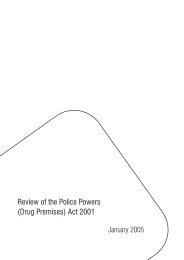Crimes (Forensic Procedures) Act 2000 - NSW Ombudsman - NSW ...
Crimes (Forensic Procedures) Act 2000 - NSW Ombudsman - NSW ...
Crimes (Forensic Procedures) Act 2000 - NSW Ombudsman - NSW ...
Create successful ePaper yourself
Turn your PDF publications into a flip-book with our unique Google optimized e-Paper software.
– the consent form or the order – will be kept in the new register, and that this should address the problems we<br />
encountered (or anyone else would encounter) in trying to access records of consent. The forensic procedures<br />
register is discussed in detail at 4.2.8.3.<br />
7.2.3. When can police ask a suspect to consent to a forensic procedure<br />
Before asking a suspect to consent to a forensic procedure, police must be satisfied that: 469<br />
• the person is in fact a suspect<br />
• the suspect is a capable adult<br />
• there are reasonable grounds to believe that the forensic procedure might produce evidence tending to<br />
confirm or disprove that the suspect committed an offence, and<br />
• the request for consent is justified in all the circumstances.<br />
We scrutinised the way police officers use their powers to conduct forensic procedures to check whether these criteria<br />
are being satisfied. We found that generally, they are. However, it appears that some police officers may have, on<br />
occasion, asked for consent in circumstances where they should not have.<br />
7.2.3.1. That the person is a suspect<br />
As discussed above, there is some confusion about the distinction between suspects and volunteers and, in<br />
some circumstances, whether a person is a suspect or volunteer will depend on whether the evidence supports<br />
a reasonable suspicion that the person committed an offence. We found that police sometimes conduct forensic<br />
procedures on people who appear to be suspects as though they were volunteers. 470<br />
7.2.3.2. That the person is an adult<br />
Before asking a suspect to consent to a forensic procedure, police must be satisfied that the person “is not a<br />
child.” 471 Evidence obtained through a forensic procedure is still admissible if police officers breach the <strong>Act</strong> because<br />
of a mistaken but reasonable belief as to the age of a child. 472 We are not aware of any problems police may have had<br />
in identifying whether a person is a child for the purpose of the <strong>Act</strong>.<br />
7.2.3.3. That the person is a capable adult<br />
Before requesting a suspect consent to a forensic procedure, a police officer must also be satisfied that the person is<br />
not an incapable person. An “incapable person” is an adult who is incapable of understanding the general nature and<br />
effect of a forensic procedure, or is incapable of indicating whether he or she consents to a forensic procedure being<br />
carried out. An incapable person cannot be asked to consent to a forensic procedure; police must apply for a court<br />
order. 473<br />
It is the responsibility of police to identify whether a person is incapable for the purposes of the <strong>Act</strong>. Police officers<br />
may refer to the following legislation and policies to help determine whether a person may be incapable:<br />
• Part 9 of the Law Enforcement (Powers and Responsibilities) <strong>Act</strong> (formerly Part 10A of the <strong>Crimes</strong> <strong>Act</strong>) deals<br />
with detention after arrest for the purpose of investigation. It contains a number of safeguards for certain<br />
“vulnerable persons,” including people with impaired intellectual functioning. “Impaired intellectual functioning”<br />
is defined as the total or partial loss of a person’s mental functions, a disorder resulting in learning difficulties<br />
or a disorder, illness or disease that affects a person’s thought processes, perceptions of reality, emotions or<br />
judgement, or that results in disturbed behaviour. 474<br />
• Schedule 2 of the Law Enforcement (Powers and Responsibilities) Regulation 2005 (formerly the <strong>Crimes</strong><br />
(Detention After Arrest) Regulation 1998) sets out a number of factors police officers should consider to<br />
help determine whether a detained person has impaired intellectual functioning – whether the detained<br />
person appears to have difficulty understanding questions and instructions, to respond inappropriately or<br />
inconsistently to questions, to have a short attention span, to receive a disability support pension, to reside<br />
at a group home or institution, or be employed at a sheltered workshop, to be undertaking education, or to<br />
have been educated at a special school or in special education classes at a mainstream school, or to have an<br />
inability to understand a caution. 475<br />
• The <strong>NSW</strong> Police Code of Practice for Custody, Rights, Investigation, Management and Evidence provides<br />
further guidance for officers dealing with people with impaired intellectual functioning. It adopts the same<br />
definition and indicators as the Law Enforcement (Powers and Responsibilities) Regulation, but includes a<br />
number of additional factors – whether the person identifies himself or herself as someone with impaired<br />
<strong>NSW</strong> <strong>Ombudsman</strong><br />
DNA sampling and other forensic procedures conducted on suspects and volunteers under the <strong>Crimes</strong> (<strong>Forensic</strong> <strong>Procedures</strong>) <strong>Act</strong> <strong>2000</strong> 89

















